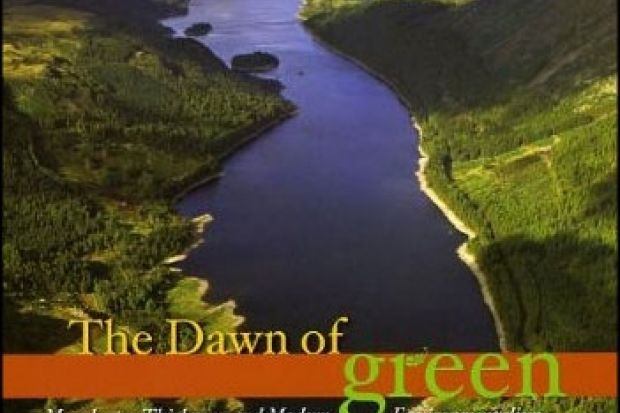Prior to picking up The Dawn of Green, I had been re-reading Edward Abbey's novel The Monkey Wrench Gang. First published in 1975, it concerns the activities of four misfits with a shared love of wilderness. They wage a war on behalf of nature by using monkey wrenches to disable any machinery that is being deployed to degrade, pollute or destroy the environment. Having some success in this venture, they decide on their ultimate project: to destroy the Glen Canyon Dam, which Abbey believed had had disastrous consequences for the Colorado River and its surrounding ecosystem. Abbey, the self-styled "desert anarchist", wanted the novel to have an impact on global environmentalism, even though in the real world, Glen Canyon was a lost cause. But he was not disappointed. Four years after the novel appeared, a group of "wilderness warriors" called Earth First! was founded with the express aim of realising his dream of direct action: that is, violence against the machine but not against people. It is still going strong.
After such excitement, the case scrupulously documented by the historian Harriet Ritvo in her new book may seem very tame, and even irrelevant. In 1875, the Waterworks Committee of Manchester planned to transform Thirlmere, a lake in Cumberland, into a reservoir, thereby ensuring a plentiful supply of clean water for Mancunians. News of the plan led to the formation of the Thirlmere Defence Association, a highly respectable body comprising landowners, small farmers, residents, regular visitors and journalists. The association failed, the work was undertaken (after a series of delays) and, by 1894, the reservoir was functioning.
There were no crazy activists involved, there was no sabotage and there was no positive outcome. So why should we be interested? One good reason is the quality that may initially seem unpromising: Ritvo's attention to detail. Her book conveys in vividly minute particulars how difficult and frustrating the campaign must have been, and how divided the campaigners were in their loyalties. Without such detail, lessons cannot be learnt. Nor is documentation allowed to obscure the larger picture. Ritvo shows the whole business to be, in contrary ways, representative of its times: "if Manchester was the icon of the Victorian future, the Lake District was the icon of nature, poetry and heritage".
It was in the spirit of the poet William Wordsworth that the Victorian cultural critic John Ruskin spoke out passionately against the Thirlmere scheme. Inspired by both, Canon H.D. Rawnsley took a leading role in the Thirlmere Defence Association. He found, in the end, that compromise was the only answer - coaxing concessions to the environment from the committee here and there - but it was his experience of this campaign that prompted him to go on to help found the National Trust in 1895. All this material is clearly and carefully narrated here, with the added interest of copious illustrations.
But what of the wider significance of Ritvo's painstaking scholarship? In her penultimate chapter, she informs us that, in the first decade of the 20th century, the city planners of San Francisco designated the spectacular Hetch Hetchy Valley as the site of the city's future water supply. The fact that the valley was part of the Yosemite National Park did not deter them. To counter a well-orchestrated protest campaign, the planners turned to Manchester for advice. The advice worked, and the project was completed. As Ritvo remarks: "The defenders of Thirlmere ... never stood a chance, and the same was true of the defenders of Hetch Hetchy Valley."
I began reading this book with the assumption that Edward Abbey would have thought life too short to bother with it. But I ended it by reflecting that he may well have read it carefully, resolved to learn its sombre, scholarly lesson - and then renewed the struggle more vigorously than ever.
The Dawn of Green: Manchester, Thirlmere, and Modern Environmentalism
By Harriet Ritvo
University of Chicago Press
248pp,
£18.00
ISBN 9780226720821
Published October 2009
Register to continue
Why register?
- Registration is free and only takes a moment
- Once registered, you can read 3 articles a month
- Sign up for our newsletter
Subscribe
Or subscribe for unlimited access to:
- Unlimited access to news, views, insights & reviews
- Digital editions
- Digital access to THE’s university and college rankings analysis
Already registered or a current subscriber? Login
